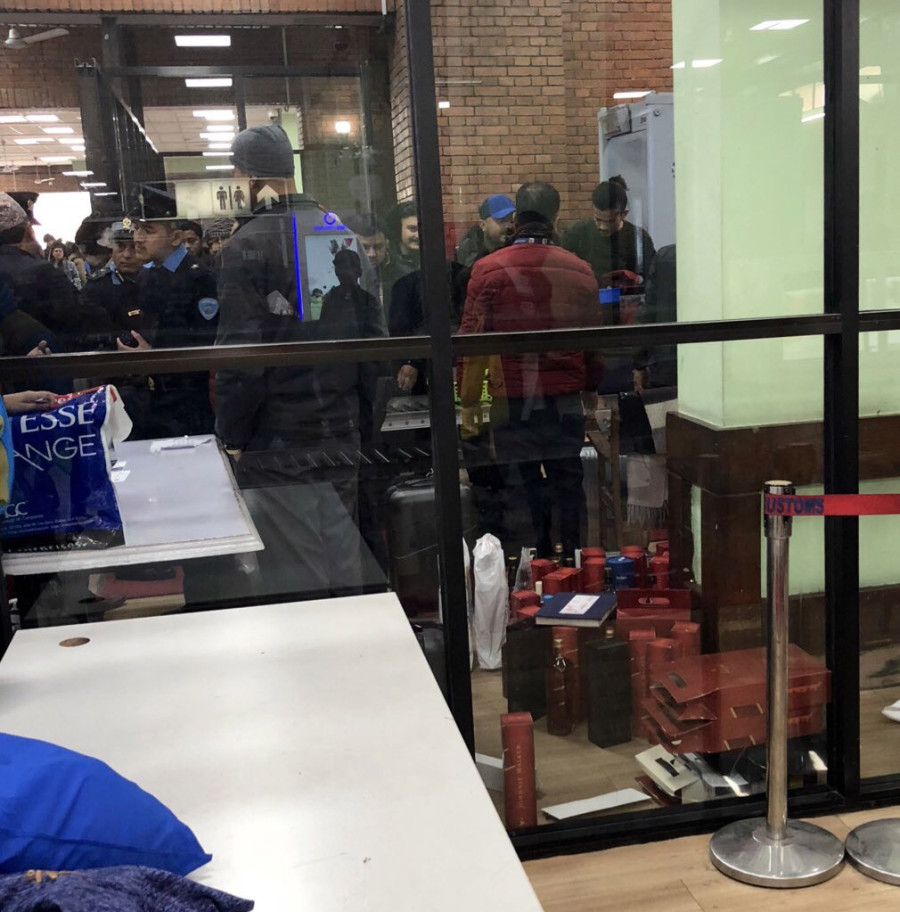National
Customs office says it’ll put up seized liquor for auction but is vague on details
The Department of Customs says it will put up thousands of bottles of liquor seized at the Tribhuvan International Airport for an auction, but what it won’t say is: when. Nor does it say how it decides the time of auction.
The Department of Customs says it will put up thousands of bottles of liquor seized at the Tribhuvan International Airport for an auction, but what it won’t say is: when. Nor does it say how it decides the time of auction.
A new customs rule that went into effect following the fiscal budget in May last year allows a single passenger no more than one litre of the alcoholic beverage. But a strict enforcement of the rule started only from January 1.
As the department continues to collect dozens of bottles every day from passengers—most of whom are returning migrant workers from the Gulf countries—questions now are being asked as to where do these confiscated liquor go.
Customs officials reiterate the products will be auctioned, but their responses are vague.
“I have asked the officials concerned at the airport customs to put the confiscated products up for an auction soon,” said Toyam Raya, director general of the Department of Customs.
When asked how the department decides when the confiscated liquor will be put up for auction, Raya said the department has been conducting the auction only after collecting “a significant amount”. He stopped short of explaining what makes “a significant amount”.
Airport customs officials say around 2,000 bottles of different brands of alcohol have been confiscated since they started enforcing the rule this year.
With the alcoholic beverages collected in huge amounts, there are growing concerns about irregularities, because of the airport customs’ poor record maintenance system.
“As the customs department does not have a proper mechanism to keep records, the possibility of confiscated liquor making way to some officials’ houses cannot be ruled out,” said a member of the commodity association of the Federation of Nepalese Chambers of Commerce and Industry.
Raya claimed that customs officials “maintain records” but admitted that details of inbound Nepali passengers are maintained only if they approach the officials. When asked why the department started enforcing the rule “strictly” only recently, customs officials made some sweeping statements.
“The government was earlier lenient on individual-based import, but many people were found to be bringing alcohol for trading purposes,” said Shiva Prasad Bhandari, spokesperson at the Department of Customs, but he failed to give any account of people trading liquor they had brought from abroad.
Lack of knowledge of the new rule seems to be the reason inbound Nepalis are carrying more liquor bottles than they are allowed. However, customs officials’ failure to strictly enforce the rule and authorities’ failure to make the general public aware of the regulation also led to an increase in individual-based import of liquor.
Officials admit that confiscation of alcohol at the customs check is being carried out on an ad-hoc basis.
Santosh Pandey, past president of the Federation of Liquor Associations Nepal, says the fall in price of branded alcoholic drinks at duty free shops of foreign countries also has attracted the inbound visitors to bring in liquor in more quantities.
Airline companies also need to inform passengers about the items, including liquor, they can carry at the time of issuing boarding passes, but this does not seem to be working.
A Nepal Airlines Corporation official told the Post that passengers often tend to ignore the advice.
Captain Vijaya Lama, a spokesperson for the national carrier, claimed that the company has been notifying its passengers about the rules and guidelines while issuing boarding passes to its passengers. “But some tend to ignore the corporation’s guidelines,” Lama said.
As per the customs office, two weeks ago officials seized 300 bottles of liquor in a single day. “A general calculation suggests liquor worth Rs900,000 was imported illegally on the day,” said Dhruba Raj Biswokarma, the chief customs officer at the airport customs. Strict enforcement of the rule is part of government’s bid to control revenue leakage in the wake of a surge in the number of people bringing in more than one litre of alcohol, he added.
He also said the confiscated liquor would be auctioned but did not give a specific date. “We have formed a price assessment committee that will fix the floor price for bidding,” Biswokarma told the Post.
Categorising alcohol and tobacco as “items harmful to health”, the government has increased the duty on these products. The government imposes excise duty of up to Rs1,204 per litre on the imported alcohol.
As per the budget, the government has targeted Rs28.84 billion in excise duty from liquor business in the current fiscal year. The government had collected Rs23.48 billion in 2017-18 and Rs18.73 billion in 2016-17 in revenue from liquor.
According to Nepal Beverage and Cigarette Industries Association, the market for domestic liquor business amounted to Rs60 billion last year.
As per the association, the imported alcoholic beverages account for 10 percent of the transactions of domestic products. “In recent days, there has been growing attraction towards imported alcoholic beverages,” said Ramesh Shrestha, president of the association. “As the distributors at duty free shops offer and sell liquor at a competitive rate, buyers are getting the products at lower rates.”
The Customs Department last put up liquor seized from airport travellers for an auction in October.




 9.83°C Kathmandu
9.83°C Kathmandu













